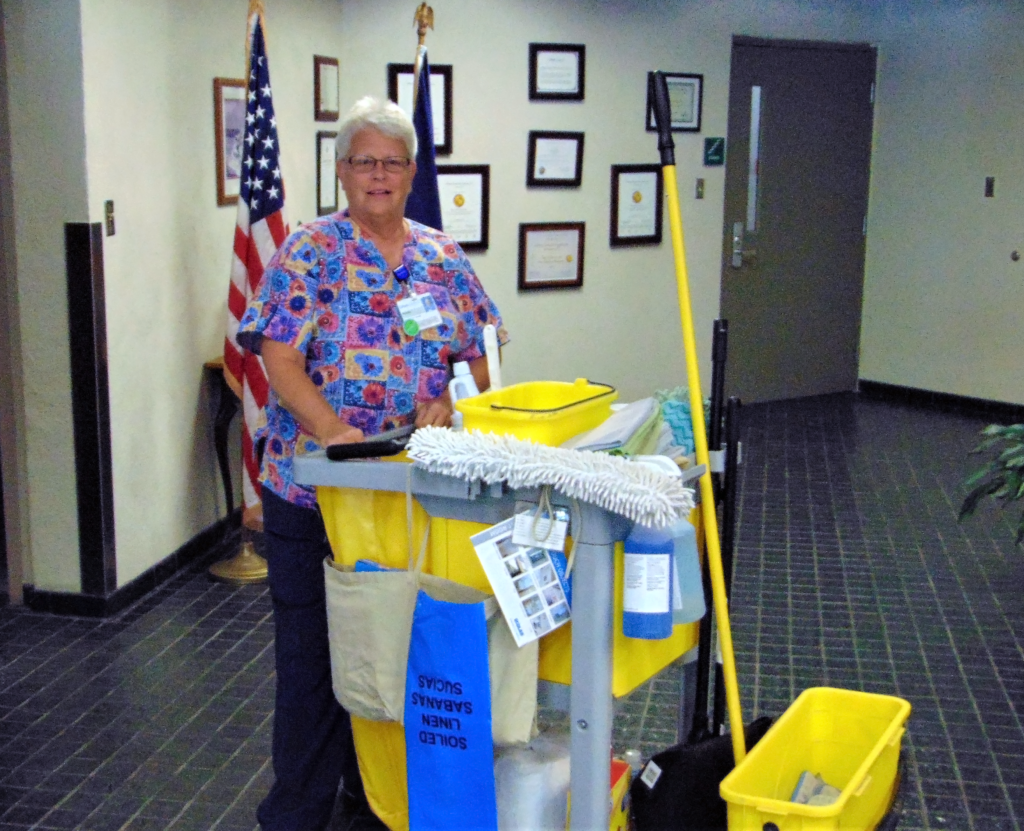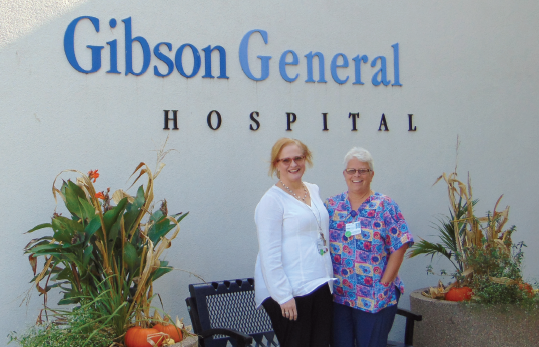Environmental Service Technicians (EVS) play an essential role in quality of care and patient safety through a clean healthcare environment. In May 2019, the Indiana Hospital Association hosted the first Certified Healthcare Environmental Services Technician (CHEST) training for Indiana rural and critical access hospitals. The CHEST training is a three-day program through the Association for the Health Care Environment (AHE), an arm of the American Hospital Association. The Small Rural Hospital Improvement Project (SHIP), a grant funded through the Indiana State Office of Rural Health and HRSA, provided funds for IHA to fully-fund SHIP-participating rural and critical access hospitals to attend the three-day immersive training. Gibson General Hospital was one of 19 represented organizations to attend the training program. As a participant of the SHIP grant, Gibson has involved themselves in several projects over the years to improve hospital best practices. The CHEST training was a new opportunity that Gibson was excited to pursue.
Patient Safety Experience
Bonnie Folsom is the Environmental Services (EVS) Supervisor at Gibson General Hospital; a 25-bed critical access hospital in Princeton, Indiana with a mission to provide high-quality, patient-centered, cost-effective care for people in the community. Bonnie oversees a director and two supervisors and four community, offsite clinics, as well as the hospital. As EVS Supervisor, her role includes several components: floor care, laundry, EVS, surgery-room cleaning, call-in and all staff coverage, support of new staff in two-week employee training, and one-on-one training after orientation. As a former factory worker, Bonnie found an unexpected job at Gibson General Hospital 13 years ago in the EVS department. When Angela Clayton, Gibson’s Quality Outcomes Specialist and Infection Preventionist approached Bonnie with the opportunity to attend the CHEST training and opportunity to become a certified CHEST trainer it was an opportunity she could not pass on. With no knowledge about the program prior to attending, Angela and Bonnie were eager to learn EVS best practices and network with other Indiana critical access hospitals. Over three days, the Gibson team learned about infection prevention, cart set-up strategies, cleaning chemicals, isolation rooms, supervisor roles, and more.

Upon completion of the three-day training program, complete with a train-the-trainer designation, and graduation, cake, and celebration, Bonnie took numerous new concepts back to the Gibson General Hospital management and EVS teams to implement best strategies for cleanliness in the healthcare environment. “The first thing I did was standardize our carts,” said Bonnie. Upon approval from the training with her CHEST teammate and coworker, Angela, Bonnie worked to remove harsh chemicals from the organization’s cleaning carts and replace with minimal products that serve to disinfect every surface encountered. Five months later, Bonnie reports the cleaning carts have remained standardized since her initial revamp and the organization has saved numerous dollars with the new cleaning chemical implementation and removal of several, additional products. Bonnie partnered with the EVS and laundry service teams to change the type of laundry detergent being used throughout the organization. Bonnie has also worked with her EVS staff to implement a strategy to improve patients’ understanding of the EVS role and get feedback from patients to improve patient experience. Paper tents have been implemented into each patient room with information about the EVS staff members that will be cleaning their room, what they can expect from the EVS team, and includes an area where patients can leave feedback for the staff members. This feedback is shared with Bonnie and necessary changes are made directly with the staff member. “We need to set expectations for ourselves as EVS,” says Bonnie. These expectations have turned into best practice management strategies for Gibson’s EVS team.

In close to five months, Bonnie has supported several improvements in the EVS structure of the hospital, from cleaning and organization to new staff orientation, however, the work does not stop there. In the upcoming months, Bonnie is excited to continue having team huddles and one-on-one meetings with staff members and management teams. Bonnie is also excited to begin training additional staff members through the CHEST train-the-trainer designation. Bonnie and Angela will jointly conduct the training program one day per week for three weeks. The training cohort will be guided through the ten learning modules Bonnie and Angela completed a few months prior and receive their CHEST certification. Bonnie hopes to train members from all over the organization from surgery team members, nursing staff, and even other directors. Bonnie is dedicated to making the learning process fun, similar to her experience with the AHE trainers who trained her.
As Bonnie reflects on her experience through the CHEST program, she can’t help but share her experiences and recom-mendations for other hospitals. Angela and Bonnie echo,
“You have to do the CHEST program! You do not need to be an EVS staff member to complete the training. All areas of the hospital will be impacted by this training.” Bonnie also notes her experiences outside of the hospital setting. “You can train your kids at home even! My grandson, Zeke, loves to learn what I am learning from this program,” says Bonnie. Angela notes that the entire Gibson team is proud of Bonnie and her work, but nothing can top the support she has at home from her biggest fan, Zeke.
In the upcoming years, Bonnie is excited to continue her education in EVS and support improvements wherever she can at Gibson General Hospital and beyond. As Bonnie notes, “The inside of the hospital should be the same as the outside and vice versa.” The Indiana Hospital Association is proud to support Bonnie and her team at Gibson General Hospital and all EVS staff members across Indiana.

